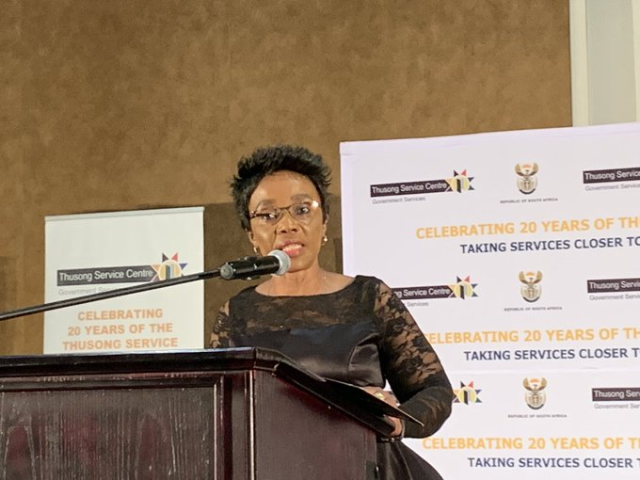Global Conference Calls for Urgent Action to Close Gendered Economic Gaps
In her keynote address, Minister Chikunga detailed the enduring economic marginalization of women globally, despite decades of advocacy and policy interventions.

- Country:
- South Africa
Minister in the Presidency Responsible for Women, Youth and Persons with Disabilities, Sindisiwe Chikunga, has sounded the alarm over the enduring global socio-economic inequalities faced by women and girls, describing the status quo as both “untenable and unsustainable.” Her remarks came during the opening session of the Global Conference on Financial Inclusion and Women Empowerment, being held at Sun City Resort, North West Province, from 6–9 May 2025.
The high-profile event marks a significant convergence of the 2nd Empowerment of Women Working Group (EWWG) and the Financial Inclusion Conference, organized under the broader agenda of South Africa’s G20 Presidency. Hosted by the Department of Women, Youth and Persons with Disabilities (DWYPD), the conference seeks to shape future G20 policy discourse with the development and promotion of a Guidelines Framework for Mainstreaming Women’s Priorities. This aims to keep women’s financial empowerment at the core of global economic and institutional reform.
Persistent Challenges in Women’s Economic Participation
In her keynote address, Minister Chikunga detailed the enduring economic marginalization of women globally, despite decades of advocacy and policy interventions. “Poverty continues to rob women and girls of essential services, including healthcare and education,” she said. “Their exclusion from economic opportunities persists throughout their lives, impeding not only personal advancement but national development.”
The Minister noted a broad set of systemic barriers faced by women, including:
-
Underrepresentation in economic decision-making roles
-
Limited access to credit and capital
-
Wage inequality and employment discrimination
-
Burden of unpaid care work
-
Lack of digital financial inclusion
Even in regions where female labour force participation is higher, Chikunga noted that employment is frequently precarious, consisting of informal or self-employment with minimal security, social protection, or growth potential.
Entrepreneurship without Support
Addressing the role of entrepreneurship in women’s empowerment, the Minister highlighted that many women entrepreneurs remain confined to the informal sector due to poor access to formal financial services and products. “Only a handful of financial institutions offer services tailored to women’s unique business and personal needs,” she said, underscoring the need for inclusive product design and delivery.
Chikunga also pointed to the lack of critical business skills among many aspiring women entrepreneurs—skills that are necessary to manage, grow, and sustain businesses effectively. She emphasized the importance of targeted capacity-building initiatives and inclusive financial education.
Global Goals at Risk
Chikunga expressed concern over the slow progress toward achieving Sustainable Development Goal 5, which advocates for gender equality and the empowerment of all women and girls. She revealed that SDG 5 is among the 37% of the UN’s 2030 Sustainable Development Goals that are not on track for achievement.
Adding to this urgency, she highlighted the impact of growing national and global debt pressures, which threaten to plunge millions more women into extreme poverty. Debt servicing, she warned, is increasingly diverting crucial resources away from investments in public goods such as healthcare, education, and gender equity initiatives.
Hope Amidst Headwinds
Reflecting on the recent 30-year commemoration of the Beijing Declaration and Platform for Action at the Commission on the Status of Women in New York, Chikunga described a shared international sentiment of both hope and apprehension. “We are hopeful for a better future, but we are also witnessing significant pushback against gender equality from powerful quarters,” she noted.
The G20 Platform for Action
The conference, anchored in South Africa’s G20 agenda, aligns with several key strategic frameworks, including:
-
The United Nations Sustainable Development Goals (SDGs)
-
The African Union’s Agenda 2063
-
South Africa’s National Development Plan (NDP) 2030
-
G20 2025 priorities
-
The EWWG’s Key Priority 2: Promoting Financial Inclusion of and for Women
These frameworks all underscore the central role of financial inclusion as a lever for unlocking women's full economic potential and achieving broader societal transformation.
A Call to Action
The Global Conference represents more than just a discussion forum; it is a strategic platform aimed at generating actionable commitments and tools to guide governments, financial institutions, and civil society in prioritizing gender-responsive policies. The introduction of a Guidelines Framework for Mainstreaming Women’s Priorities is expected to serve as a blueprint for countries striving to bridge gender gaps and foster inclusive growth.
As the world navigates complex economic challenges, Chikunga’s call to “break the cycle of gendered poverty and exclusion” resonates as a critical imperative for international development and long-term stability.










